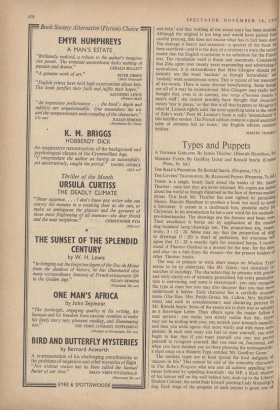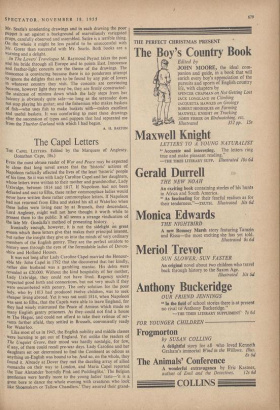Types and Puppets
THE RAKE'S PROGRESS. By Ronald Searle. (Perpetua, 15s.) THE LOVERS' TRAVELOGUE. By Raymond Peynet. (Perpetua, 7s. 6d.) THERE is a single, lonely fault about the books of Mr. Jame; Thurber : once lent they are never returned. My copies are dottea about the world as though dispersed in the face of thermo-nuelent threat. This fault Mr. Thurber has now righted by permitting Messrs. Hamish Hamilton to produce a book too small to tentlg a borrower. It comes in a cardboard box, postable early for Christmas. In his introduction he has a new word for his methods: pre-intentionalist. The drawings are the famous and basic ones. Their excellence is borne out by application of the routine dog/standard lamp/drawings test. The proportions are, respY" tively, 3 : 12 : 28. Some may say that the proportion of dogs to drawings (3 : 28) is short of perfection, but everyone Will agree that 12 : 28 is exactly right for standard lamps. I recont• mend A Thurber Garland as a present for the near, for the dearl and also—as a hint from the owners—for the present holders d' other Thurber books.
The way to prepare to write short essays on Modern Types seems to be to undertake, like Mr. Gorer, vast statistical re' searches in sociology. The characters that he presents with precise and witty clarity are of necessity generalised, but every generalisn- tion is convincing, and none is stereotyped : you may recognise the type at once but you may also discover that you had never understood it before. Each character has a carefully invented name (The .Hon. Mrs. Peddy-Green, Mr. Callow, Mrs. McMaiw mon), and each its complementary and shattering portrait bY Mr. Ronald Searle. Some of the essays are in their way as salutarY as a Screwtape Letter. Their effects upon the reader follovi neat pattern : you smile; you slowly realise that Mr. Gore may not be smiling with you; you scratch your stomach uneasilYl and then you smile again—but more warily and with more coil' passion. In each next essay you fear to meet yourself; you even begin to fear that if you meet yourself you may not perrni; yourself to recognise yourself. But you read on, fascinated, and when you have finished you sit there planning the unimaginable: a shprt essay on a Modern Type, entitled 'Mr. Geoffrey Goren' The modern types are at least spared the final indignity Of 'success in life.' This cannot be said of the miserable characters in The Rake's Progress who one and all achieve appalling suc" cesses followed by appalling downfalls: the MP, a black shadow of his former self on the wall behind him, ends up in the Liberal Shadow Cabinet; the artist finds himself painting Lady Munnings's dog. Each stage of the progress of each puppet is given one of
Mr. Searle's unrelenting drawings and in each drawing the poor Puppet is set against a background of marvellously variegated Props, carefully observed and assembled. Satire is a terrible thing. On the whole it might be less painful to be unsuccessful with Mr. Gorer than successful with Mr. Searle. Both books are a warning and a delight. In The Lovers' Travelogue M. Raymond Peynet takes the poet and his bride through all Europe and to points East. Innocence and feather-light conceits are the theme of the drawings. The InnOcence is convincing because there is no ponderous attempt to ignore the delights that are to be found by any pair of lovers In whatever country they visit. The conceits are convincing because, however light they may be, they are firmly constructed : the staircase of minims down which the lady steps from her balcony is obviously quite safe—so long as the serenader does not stop playing his guitar; and the fisherman who makes baskets Of fish—who uses fish to make baskets with—makes excellent and useful baskets. It was comforting to meet these drawings after the succession of types and puppets that had separated me from the Thurber Garland with which I had begun.
A. H. BARTON











































































 Previous page
Previous page